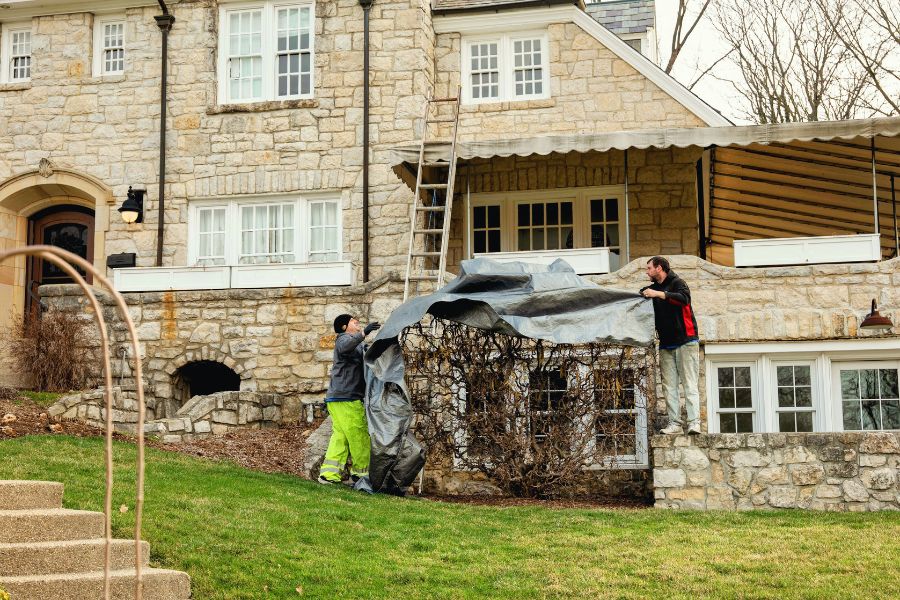
How Power Washing Affects Your Plants (And How We Protect Them)
Many homeowners worry about the impact of power washing on their landscaping. If you’ve invested time and money into a beautiful yard, the last thing you want is for your flowers, shrubs, or trees to be harmed during a professional cleaning. At Master Blaster Power Washing, we take every precaution to ensure your landscaping stays safe while we restore your home’s exterior.
So, can power washing damage plants? The answer depends on the method used, the cleaning solutions applied, and the experience of the professionals handling the job. Below, we’ll break down how power washing interacts with plants and how our team takes extra steps to protect your greenery.
Does Power Washing Harm Plants?
Power washing can affect plants, but only if proper precautions aren’t taken. The main concerns when power washing near landscaping include:
1. Chemical Exposure
Many cleaning solutions contain bleach or detergents designed to break down mold, mildew, and dirt. If these solutions come into direct contact with plants and are not properly diluted or rinsed off, they can cause leaf discoloration, wilting, or even plant death. However, professional power washing companies like Master Blaster Power Washing use techniques that minimize chemical exposure to your plants.
2. Water Pressure Damage
A high-pressure water stream can break fragile stems, strip leaves from plants, or even uproot flowers if used improperly. This is especially true for delicate species like Japanese maples and annual flowers that have thin stems and shallow roots. We always adjust our pressure settings when working near landscaping to ensure no damage occurs.
3. Soil Disruption
Excessive water flow can erode soil, washing away nutrients and exposing roots. This is why we control our water output and avoid excessive saturation in garden beds or near tree bases.
How We Protect Your Landscaping
At Master Blaster Power Washing, we prioritize plant safety while delivering high-quality cleaning results. Here’s how we ensure your yard remains intact:
1. Pre-Watering the Area
Before we begin, we thoroughly pre-soak all surrounding plants and soil with fresh water. Why? A well-hydrated plant is less likely to absorb any stray cleaning agents. Just like you wouldn’t pour a strong drink on a full stomach, plants can better withstand mild exposure when they’re already saturated.
2. Using Biodegradable Detergents
Whenever possible, we use eco-friendly and biodegradable cleaning solutions that break down safely without harming your plants or soil. While some areas may require stronger solutions, we dilute chemicals appropriately to prevent any lasting damage.
3. Covering Sensitive Plants
For especially delicate or high-value plants, we may use tarps or plastic coverings to create a barrier between the cleaning solution and the greenery. This is particularly important for flower beds, potted plants, and delicate shrubs.
4. Rinsing Plants After Cleaning
Once the power washing job is complete, we thoroughly rinse off any surrounding plants to ensure no cleaning residue remains. This extra step is crucial in hot weather when chemicals can evaporate and become more concentrated on leaves.
5. Adjusting Water Pressure and Spray Angles
We always tailor our power washing techniques to avoid direct high-pressure contact with plants. For areas close to gardens or flower beds, we use a soft washing method—low-pressure water combined with gentle detergents—to achieve a deep clean without harming surrounding vegetation.
Are Some Plants More Susceptible Than Others?
Yes! Certain plants are more vulnerable to power washing exposure than others. Here are a few examples:
- Highly sensitive: Japanese maples, ferns, hydrangeas, and impatiens.
- Moderately sensitive: Roses, azaleas, hostas, and perennials.
- Hardier plants: Evergreens, boxwoods, and ornamental grasses.
If you have concerns about a specific type of plant, let us know! We can take extra precautions tailored to your landscaping.
What If My Plants Are Accidentally Damaged?
While we take every step to prevent damage, accidents can happen. In rare cases where a plant experiences stress, here’s what you can do:
- Thoroughly rinse the plant with fresh water to remove any lingering chemicals.
- Trim affected leaves to encourage new growth.
- Apply a mild fertilizer to help the plant recover.
- Monitor for signs of improvement—most plants bounce back within a few weeks!
Why Choose a Professional Power Washing Company?
Power washing isn’t just about blasting dirt away—it’s about doing it safely and effectively. Choosing a professional team like Master Blaster Power Washing ensures your home gets the deep clean it needs without sacrificing the beauty of your landscape. We use industry best practices to protect your plants while delivering top-tier exterior cleaning services.
Schedule Your Power Washing Service Today!
Worried about your plants during a power washing job? Let us handle it! At Master Blaster Power Washing, we have years of experience in delivering high-quality cleaning while ensuring the safety of your landscaping.Call us today for a free estimate and let’s get your home looking spotless—while keeping your plants happy and healthy!
